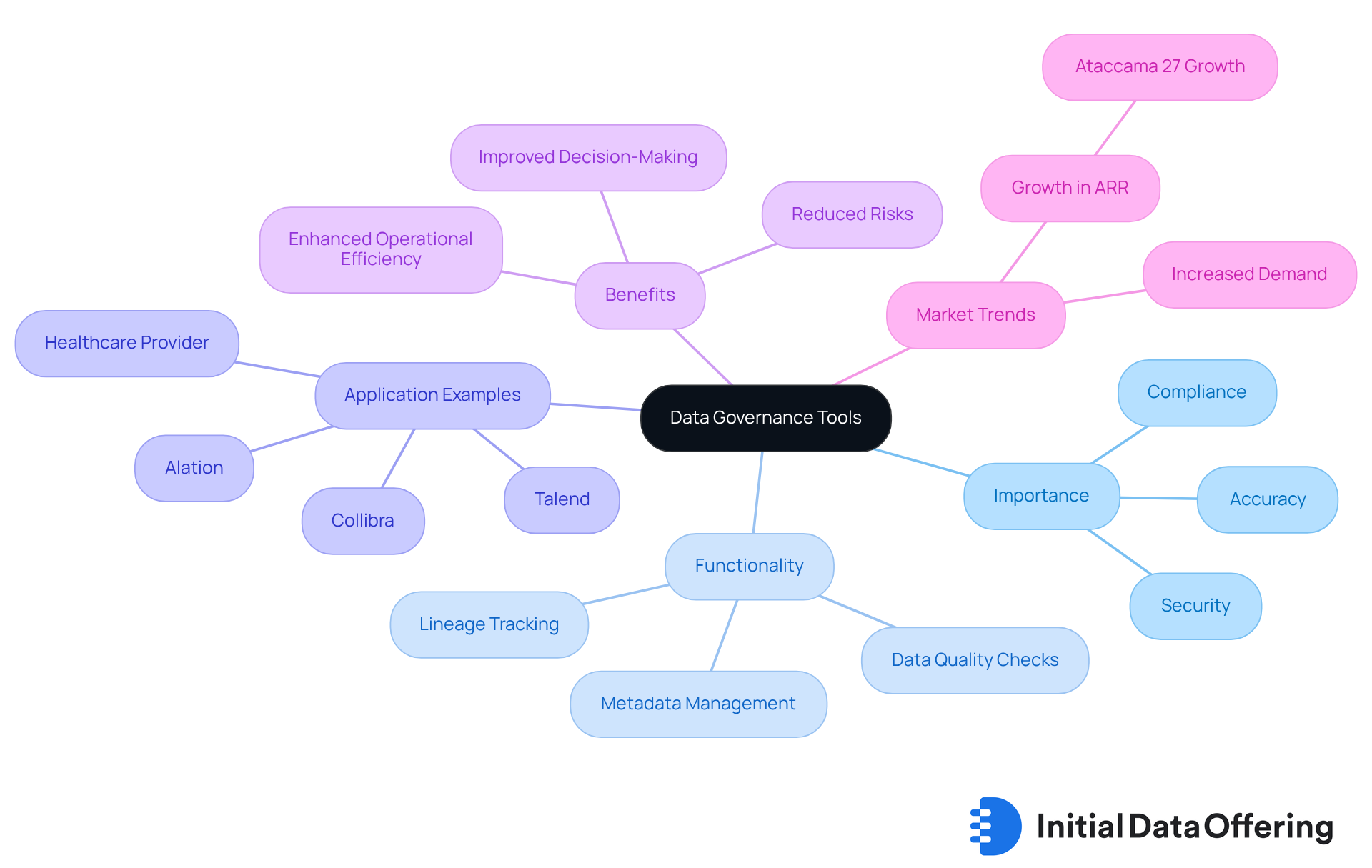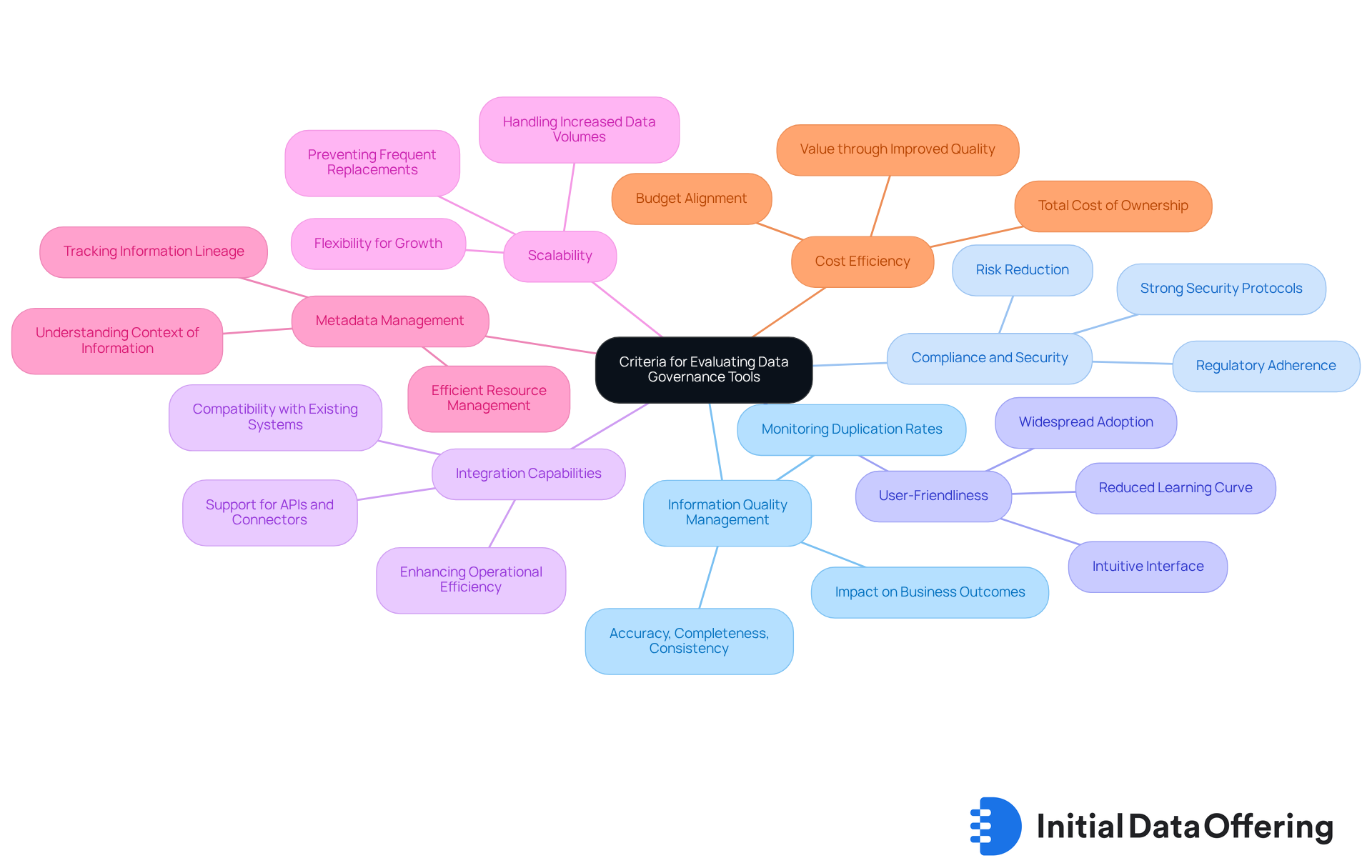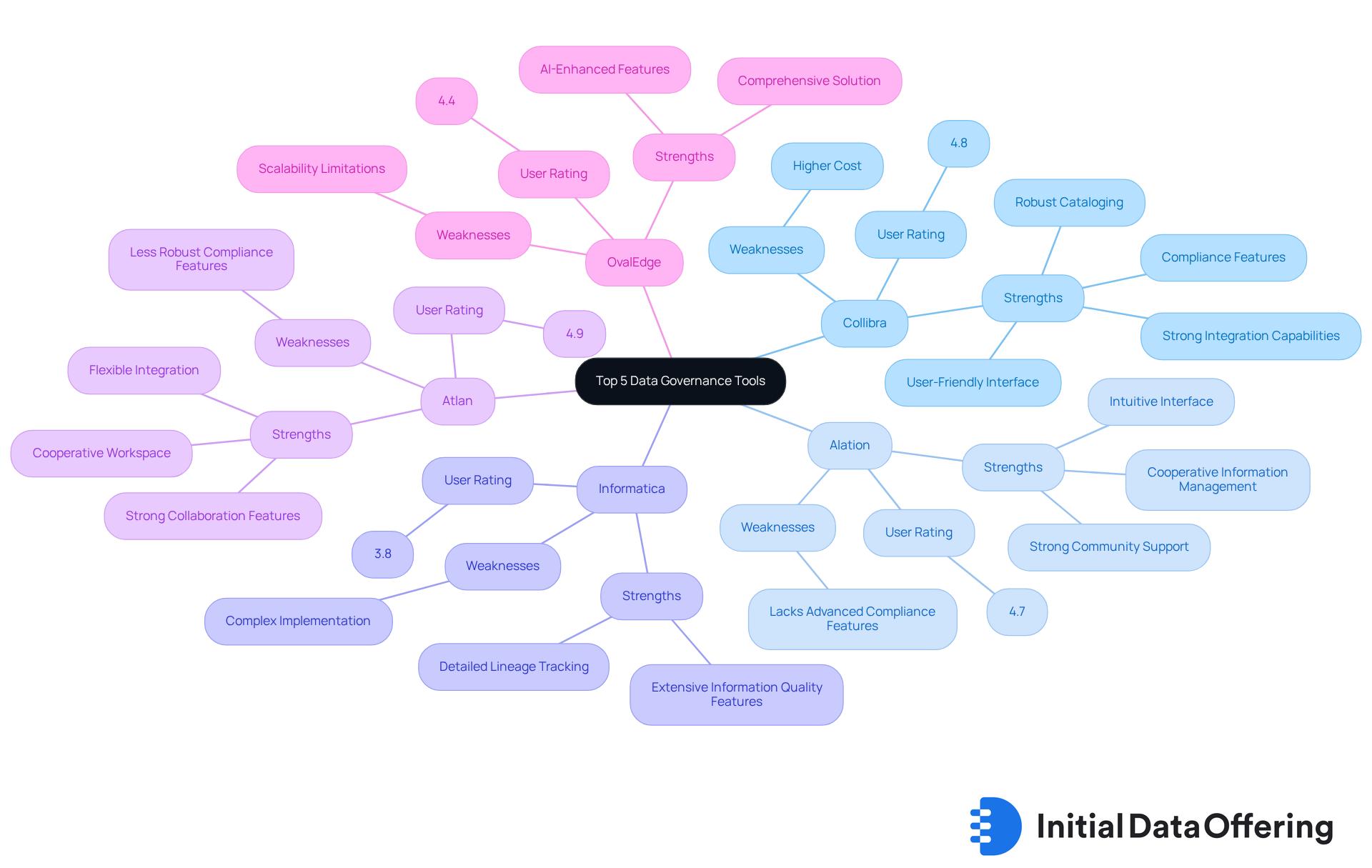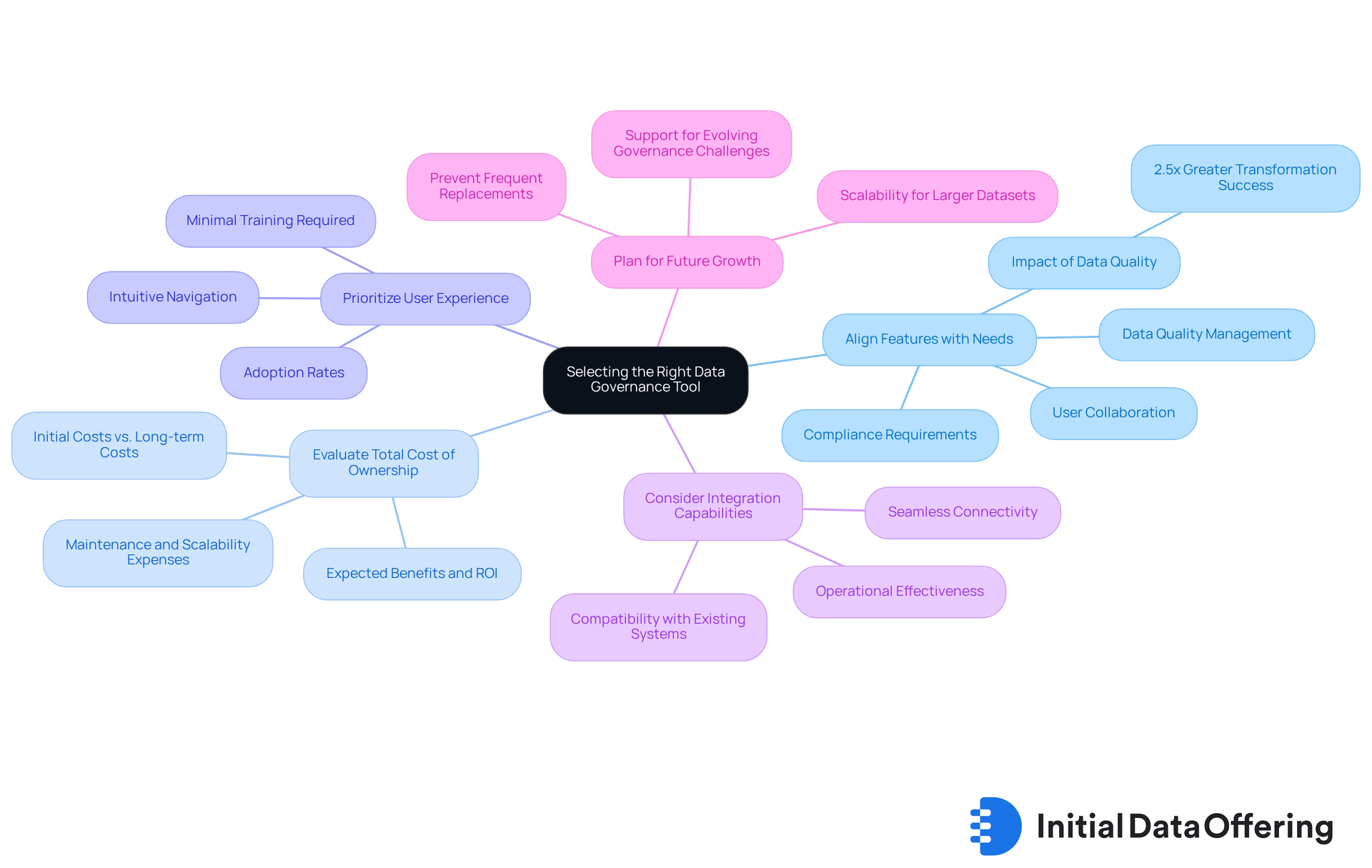5 Essential Data Governance Tools for Market Research Analysts

5 Essential Data Governance Tools for Market Research Analysts
Overview
The article identifies five essential data governance tools that are particularly beneficial for market research analysts. These tools play a crucial role in ensuring information accuracy, security, and compliance. A comparative analysis of tools such as:
- Collibra
- Alation
- Informatica
- Atlan
- OvalEdge
is provided, emphasizing their unique features and user satisfaction ratings. This analysis serves to guide analysts in their selection process.
How can these tools enhance your data governance strategies? Understanding their advantages can lead to more informed decisions in your market research efforts.
Introduction
Navigating the intricate landscape of data management is increasingly vital for market research analysts, particularly as organizations strive for accuracy and compliance in their information practices. The right data governance tools enhance decision-making and mitigate risks associated with data breaches and regulatory failures. However, with a plethora of options available, how can analysts discern which tools will truly elevate their data governance strategies and meet their unique needs? This article delves into five essential data governance tools, offering a comparative analysis that equips analysts with the insights necessary to make informed choices in a rapidly evolving environment.
Understanding Data Governance Tools and Their Importance
[Information management solutions](https://onetrust.com/blog/top-4-benefits-of-data-governance-tools), such as [data governance tools](https://velotix.ai/resources/blog/best-data-governance-tools), are essential for entities seeking to handle their resources efficiently. These data governance tools ensure information accuracy, security, and adherence to regulations, which are vital for market research analysts who rely on high-quality information for actionable insights. By enabling information stewardship, data governance tools assist organizations in creating clear policies concerning usage, ownership, and quality control. For example, a healthcare provider in Dallas implemented a strategy for managing information that standardized definitions across departments, leading to better decision-making and increased confidence in their information.
In the domain of market analysis, the implementation of data governance tools for efficient information management leads to improved decision-making, enhanced operational efficiency, and reduced risks associated with information breaches or regulatory non-compliance. Recent trends suggest that organizations are increasingly emphasizing data governance tools as they navigate the complexities of evolving information environments. Tools like Collibra, recognized for its extensive cataloging and policy enforcement, and Alation, which improves information management with AI-driven insights, are leading the charge. These features empower analysts to derive insights more confidently and ensure compliance with regulations by utilizing .
Specialist viewpoints emphasize that the appropriate resources for managing information can greatly improve the quality of insights obtained from information, ultimately influencing strategic choices. As the demand for trustworthy information continues to increase, the significance of strong oversight mechanisms and data governance tools becomes even more evident, making them essential for analysts responsible for managing intricate datasets. Moreover, the growing emphasis on information management is highlighted by Ataccama's reported 27% increase in Annual Recurring Revenue (ARR) in the first half of the year, indicating the rising acknowledgment of the necessity for reliable information management solutions.

Criteria for Evaluating Data Governance Tools
When evaluating data governance tools, several key criteria should be considered:
- Information Quality Management: This tool ensures information accuracy, completeness, and consistency—vital factors for effective decision-making. High information quality significantly improves business outcomes and adherence to regulatory standards. For instance, regular monitoring of duplication rates maintains system efficiency and precision; elevated duplication levels can lead to unnecessary storage use and costly errors.
- Compliance and Security: Strong security protocols are crucial for safeguarding sensitive information. Elements that assist with regulatory adherence help entities conform to information-related frameworks, reducing the risk of breaches. Enhanced information security protocols can greatly lower the threat of breaches, ensuring organizations remain compliant with industry standards.
- User-Friendliness: A is essential for promoting widespread adoption across teams, thereby reducing the learning curve for both technical and non-technical users. Solutions with intuitive interfaces foster adoption and enable effective interaction with the application.
- Integration Capabilities: The ability to seamlessly connect with existing systems and workflows is essential for efficient information management. Tools should be compatible with platforms like Snowflake, BigQuery, or AWS, ensuring that the resource complements the entity's current infrastructure and enhances operational efficiency.
- Scalability: As information volumes rise, the tool should scale effectively without compromising performance. This prevents the need for frequent replacements, conserving time and resources. Flexible solutions can handle larger datasets and additional information sources, which is crucial as companies expand.
- Metadata Management: Effective metadata management capabilities are essential for tracking information lineage and understanding the context of information, thereby enhancing governance practices. This includes functionalities that enable entities to classify and manage their information resources efficiently.
- Cost Efficiency: The total cost of ownership, including licensing, implementation, and maintenance, should align with the entity's budget and expected return on investment. An economical resource offers robust features without straining the budget, enhancing value through improved information quality and adherence.
Integrating these standards into the assessment process will assist entities in selecting the most appropriate data governance tools for managing information, which will ultimately enhance decision-making and compliance.

Comparative Analysis of the Top 5 Data Governance Tools
This comparative analysis highlights five leading [data governance tools](https://velotix.ai/resources/blog/best-data-governance-tools), focusing on their strengths and weaknesses to assist market research analysts in making informed decisions:
- Collibra: Renowned for its robust cataloging and compliance features, Collibra excels in stewardship and oversight workflows, making it ideal for large organizations with complex information environments. Its strong integration capabilities and user-friendly interface enhance usability. However, it comes at a higher cost compared to some competitors. User satisfaction is notable, with a rating of 4.8 for usability and support.
- Alation: This tool emphasizes cooperative information management, enabling teams to collaborate efficiently. Its intuitive interface facilitates easy information discovery and understanding. Alation is praised for its excellent user experience and strong community support, although it may lack some advanced compliance features. Recognized as a 'Customer Favorite,' it boasts a rating of 4.7.
- Informatica: A comprehensive solution, Informatica provides extensive information quality and governance features, making it well-suited for organizations that require detailed lineage tracking. Its powerful information quality management and extensive features are significant advantages, though it can be complex to implement and manage. User satisfaction is rated at 3.8, highlighting its comprehensive capabilities.
- Atlan: Designed for contemporary analytics teams, Atlan offers a cooperative workspace that integrates effortlessly with various analytical resources, making it efficient for agile settings. The strong collaboration features and flexible integration are key benefits, though it may not be as robust in compliance features as others. With a user satisfaction rating of 4.9, it is praised for its ease of use and integration.
- OvalEdge: This application merges information cataloging with management features, making it appropriate for entities pursuing a comprehensive solution. Its AI-enhanced features are beneficial for smaller entities, but it may face limitations in scalability for larger enterprises. User satisfaction is rated at 4.4, recognized for its innovative approach.
The evolving characteristics of information management necessitate that organizations adapt to strict regulations, such as GDPR and HIPAA, which are supported by data governance tools through enhanced functionalities. Moreover, resources like Velotix and IBM Watson Knowledge Catalog provide substantial functionalities in AI integration and policy enforcement, improving their efficiency in contemporary information settings. This analysis offers a clear overview for market research analysts to assess the best fit for their information management requirements.

Key Takeaways for Selecting the Right Data Governance Tool
When selecting , it is essential to consider several key takeaways that can significantly impact your organization's effectiveness in managing data governance.
- Align Features with Needs: It is crucial to ensure that the features of the data governance tools align with your organization's specific requirements, such as compliance, data quality, and user collaboration. Organizations that emphasize data quality frequently achieve 2.5 times greater transformation success rates. This statistic highlights the necessity for resources that promote strong data quality management, ultimately enhancing overall effectiveness.
- Evaluate Total Cost of Ownership: It is important to look beyond initial costs to understand the total cost of ownership. This includes maintenance and potential scalability expenses. Organizations should assess both short-term and long-term costs against expected benefits and ROI. This evaluation can reveal significant savings and efficiencies over time, making it a vital consideration in the selection process.
- Prioritize user experience by utilizing data governance tools, as an easy-to-use interface can significantly affect adoption rates and overall effectiveness. Therefore, prioritizing resources that offer intuitive navigation is essential. Tools that require minimal training or coding expertise foster widespread adoption, enhancing engagement across both technical and non-technical users. Effective management depends on streamlined workflows and collaboration among diverse teams, making user experience a key factor in the selection process.
- Consider integration capabilities by selecting a solution that includes data governance tools to ensure seamless connectivity with your current information ecosystem, including databases and cloud platforms. Robust integration abilities reduce interruptions and improve operational effectiveness. This ensures that oversight policies are actively enforced and observed throughout the information lifecycle, contributing to the overall governance strategy.
- Plan for Future Growth: It is advisable to choose data governance tools that can expand with your organization’s information requirements, ensuring long-term sustainability and support for evolving governance challenges. Choosing scalable solutions prevents frequent replacements, saving time and resources while accommodating larger datasets and additional data sources. This forward-thinking approach is vital for maintaining effective data governance.

Conclusion
The significance of data governance tools for market research analysts is profound. These solutions are pivotal in enabling organizations to manage their information resources effectively, which leads to improved decision-making, operational efficiency, and compliance with regulatory standards. By implementing the right data governance tools, analysts can enhance the quality of insights derived from data, ultimately influencing strategic business choices.
Throughout this article, we have examined various key aspects, including the critical criteria for evaluating data governance tools. These criteria encompass:
- Information quality management
- Compliance and security
- User-friendliness
- Integration capabilities
- Scalability
- Metadata management
- Cost efficiency
A comparative analysis of the top five tools—Collibra, Alation, Informatica, Atlan, and OvalEdge—has highlighted their unique strengths and weaknesses, providing valuable insights for analysts seeking to make informed decisions about which tools best meet their needs.
As organizations continue to navigate the complexities of data management, the call to action is clear: prioritize the selection of effective data governance tools that align with specific organizational requirements and future growth. By doing so, businesses can not only ensure compliance and security but also foster a culture of data stewardship that ultimately drives success in an increasingly data-driven landscape. Embracing these tools is not merely about managing data; it’s about unlocking the potential for transformative insights that can propel organizations forward.
Frequently Asked Questions
What are data governance tools?
Data governance tools are information management solutions that help organizations ensure the accuracy, security, and regulatory compliance of their data.
Why are data governance tools important for market research analysts?
They provide high-quality information for actionable insights, enabling better decision-making and operational efficiency while reducing risks related to information breaches or regulatory non-compliance.
How do data governance tools assist organizations?
They enable information stewardship by helping organizations create clear policies regarding data usage, ownership, and quality control.
Can you provide an example of data governance tools in action?
A healthcare provider in Dallas standardized definitions across departments using data governance tools, which led to improved decision-making and increased confidence in their information.
What recent trends are observed regarding data governance tools?
Organizations are increasingly prioritizing data governance tools to manage the complexities of evolving information environments.
What are some leading data governance tools mentioned in the article?
Collibra, known for its cataloging and policy enforcement capabilities, and Alation, which enhances information management with AI-driven insights.
How do data governance tools impact the quality of insights?
The right data governance resources can significantly improve the quality of insights derived from data, influencing strategic decision-making.
What evidence suggests a growing emphasis on information management solutions?
Ataccama reported a 27% increase in Annual Recurring Revenue (ARR) in the first half of the year, indicating a rising acknowledgment of the need for reliable information management solutions.